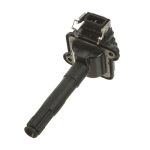Automotive engines use a coil to produce a high voltage spike to fire a spark plug that ignites the air/fuel mixture in the combustion chamber. If a fuel mixture fails to ignite in a cylinder, that causes a misfire which will usually be noticed by an engine’s PCM; triggering a fault code.
Mild occasional misfires aren’t always noticeable, but consistent misfires appear as a rough running engine. In worse cases, the PCM can shut down the ignition and fuel for a cylinder or an entire bank of cylinders which is usually called “limp mode” and will show a flashing check engine light.
A failing coil is often the prime suspect as a cause of misfires, but several things are possible. Diagnosis is usually about an hour of shop time.
Cost of Ignition Coil Replacement
To illustrate, some estimates on the ignition coil replacement cost for some common vehicles using a labor rate of $100 per hour are as follows:
- For a 2008 Volkswagen Jetta with a 2.5-liter engine, the labor time for ignition coil replacement is half an hour. A factory replacement coil costs around $4 and a Delphi part is $20. Total job cost is about $94 with OE parts and around $70 with aftermarket parts.
- For a 2005 Kia Optima with a 2.4-liter engine, the labor time for ignition coil replacement is half an hour. Expect to pay around $166 for a factory replacement coil and about $54 for an NGK part. Total ignition coil cost is $216 with OE parts and about $104 with aftermarket parts.
- For a 2004 Honda CR-V with a 2.4-liter engine, the labor time for ignition coil replacement is .3 of an hour. A factory replacement coil costs around $76 and a Denso part is about $39. Pay a total of about $106 with OE parts and about $66 with aftermarket parts.
- For a 2005 Saturn L with a 3.0-liter engine, the labor time for ignition coil (coil pack) replacement is .9 of an hour for the front bank and 1.8 hours for the rear bank. A factory replacement coil pack is about $127 and a Standard part is about $56. Total job cost with OE parts is around $217 for the front bank and about $307 for the rear bank. Using aftermarket parts, the job would cost around $146 for the front bank and about $236 for the rear bank.
One question that comes up sometimes when replacing a coil is whether it’s a good idea to replace coils as a set. For the most part, there’s no reason to replace a non-maintenance item before it has failed. Electrical parts tend to fail unpredictably, rather than as a result of age and use.
It’s also worth mentioning that there is a higher than average failure rate on aftermarket coils; while the technology is fairly simple, manufacturing a coil that operates identically to an OE coil such that it can be driven flawlessly by the PCM circuits is less easy. Whatever the cost decision, if parts are replaced for the sake of maintenance or uniformity, sometimes keeping the old coils can provide options in the unlikely event of complications.
Types of Ignition Coils
There are a few different types of coil systems. The most common modern one uses an individual coil for each spark plug; connecting directly to the spark plug which is called a “coil on plug” design.
Another is similar in that, it has a coil for each spark plug. However, instead of being replaceable individually, it is built into a single unit or a “coil pack”.
Some engines will use a coil for each pair of spark plugs that are connected to the coil by ignition wires. The oldest design uses a single coil to fire multiple spark plugs; distributing spark via a “distributor” and a set of ignition wires.
What Else Might Be Recommended
Coils are usually replaced when a misfire is detected and the diagnosis finds that they aren’t creating enough spark to fire the air/fuel mixture. This can lead to a fouled spark plug.
Normally, spark plugs can be removed and cleaned which is a fairly simple procedure. But spark plugs are also maintenance items and relatively inexpensive.
If they are close to their normal replacement interval, replacing them while servicing a coil is a reasonable recommendation and economical time to have that done, although an additional expense in parts and labor on top of the coil replacement.
On a system that uses ignition wires to carry current from coils to the spark plugs, it’s common to remove the wires either during diagnosis or during coil replacement. Ignition wires can be fragile especially if they are older and it’s common and sometimes, unavoidable to damage them in the process.
Ignition wires are also a maintenance item and relatively inexpensive. If they are in questionable shape and recommended to be replaced, that is also an ideal and economical time to replace them.
In the worst case and one of the reasons why you need to quickly address a misfire and to be conservative and thorough with the repair, a failing coil that leads to a misfire can also damage the catalytic converter. A misfire sends unburned fuel into the exhaust stream which is harmful to the coatings of the catalytic converter.
These commonly cost more than $1,000 to replace. Most of the time, it takes a little while for the damage to show up. The engine continuously monitors the condition of the catalytic converter and will set a check engine light if it sees that the vehicle emissions are not being adequately managed.

